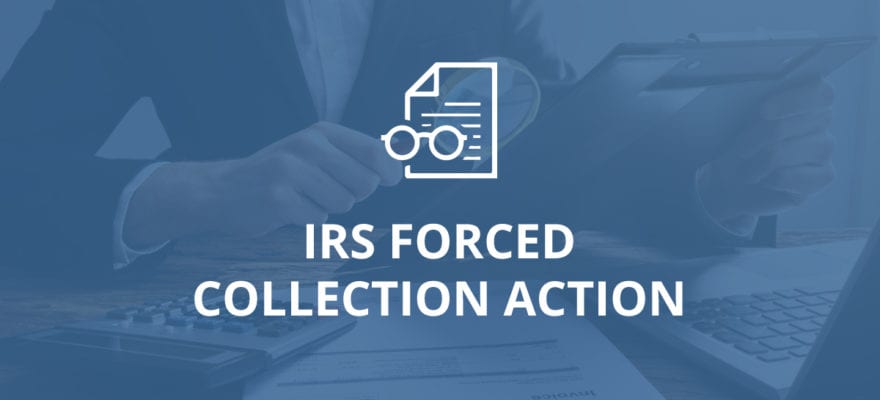When people joke about the IRS breathing down their throat, they’re usually talking about an enforced collection action. When it comes to claiming overdue taxes, the IRS has a wide repertoire of collection tools, the most dreaded of which are liens and levies that garnish your wages, seize the contents of your bank account, and force the sale of assets to satisfy your tax debt.
Fortunately, the IRS does not generally use these forceful measures unless voluntary compliance fails. Below is an overview of the forced collection tools and how a tax attorney can help you overcome them.
First Come the Notices
The IRS will send multiple notices before taking enforced collection action. Each one escalates in urgency until it sends you a LTR1058, otherwise known as a ‘Final Notice, Notice of Intent to Levy and Notice of Your Right to a Hearing.’ This letter is usually your final warning before the government initiates an enforced collection action.
Tax Levy
Internal Revenue Code §6331(a) allows the IRS to collect a tax debt by seizing any of your property that is being held by a third party. Levies may be made on your salary, bank accounts, securities, accounts receivable, and other assets that generate or represent income. If these assets are not sufficient to satisfy your tax liability, the IRS may also attempt to seize physical property.
Tax Lien
According to Internal Revenue Code §6321, the IRS can collect its money by placing a lien upon all property that you own or have an interest in. The lien equals the amount you owe, including any interests and penalties. A federal tax lien has a 10-year statute of limitations, which can be extended due to tolling events such as:
- A bankruptcy filing
- Seeing a Taxpayer Assistance Order
- Request for a Collection Due Process Hearing
Trust Fund Recovery Penalty
If you own a business that is delinquent in paying employment taxes (including Social Security and collected excise taxes), the IRS may assess a Trust Fund Recovery Penalty. These taxes are known as ‘trust fund’ taxes because the money is held in trust until you make a federal tax deposit.
A Trust Fund Recovery Penalty can be assessed against anyone who is responsible for collecting or remitting income, employment, and excise taxes and intentionally fails to pay them.
How Can You Avoid Enforced Collection?
The best way to deal with enforced collection actions is to avoid them. If you cannot afford to pay your tax debt, there are steps you can take to prevent your income and assets from being seized.
- Payment Plan: If you have filed all of your tax returns and are current on your taxes for the present tax year, you can propose a payment plan to the IRS. There are different IRS installment agreements designed to address how much you owe and whether the taxes are personal or business-related. While a payment plan is pending, the IRS cannot issue levies and after it is accepted, there will be no enforced collection action unless you default.
- Offer in Compromise: An offer in compromise (OIC) is an agreement that settles your tax debt for less than the full amount owed. In general, the IRS will an OIC if all of your tax returns have been filed, you are current on your tax payments, and the amount you offer equals or exceeds the amount it could reasonably expect to collect from you. It may also agree to an OIC if there is legitimate doubt regarding your liability or collecting from you will result in economic hardship.
Contact a New Jersey Tax Debt Attorney
If you are receiving collection notices from the IRS, Paladini Law will review your tax liability to determine what solution will yield the best results for you. Even if the IRS has already seized your bank account or served a tax levy on your wages, we can help you stop these collection measures so that you can address the debt.
Attorney Brad Paladini is one of the few attorneys in the state with a Master of Laws in Taxation, so he knows the law thoroughly and can recommend strategies that eliminate your problems with the IRS. For more information, please contact us or call 201-381-4472.



